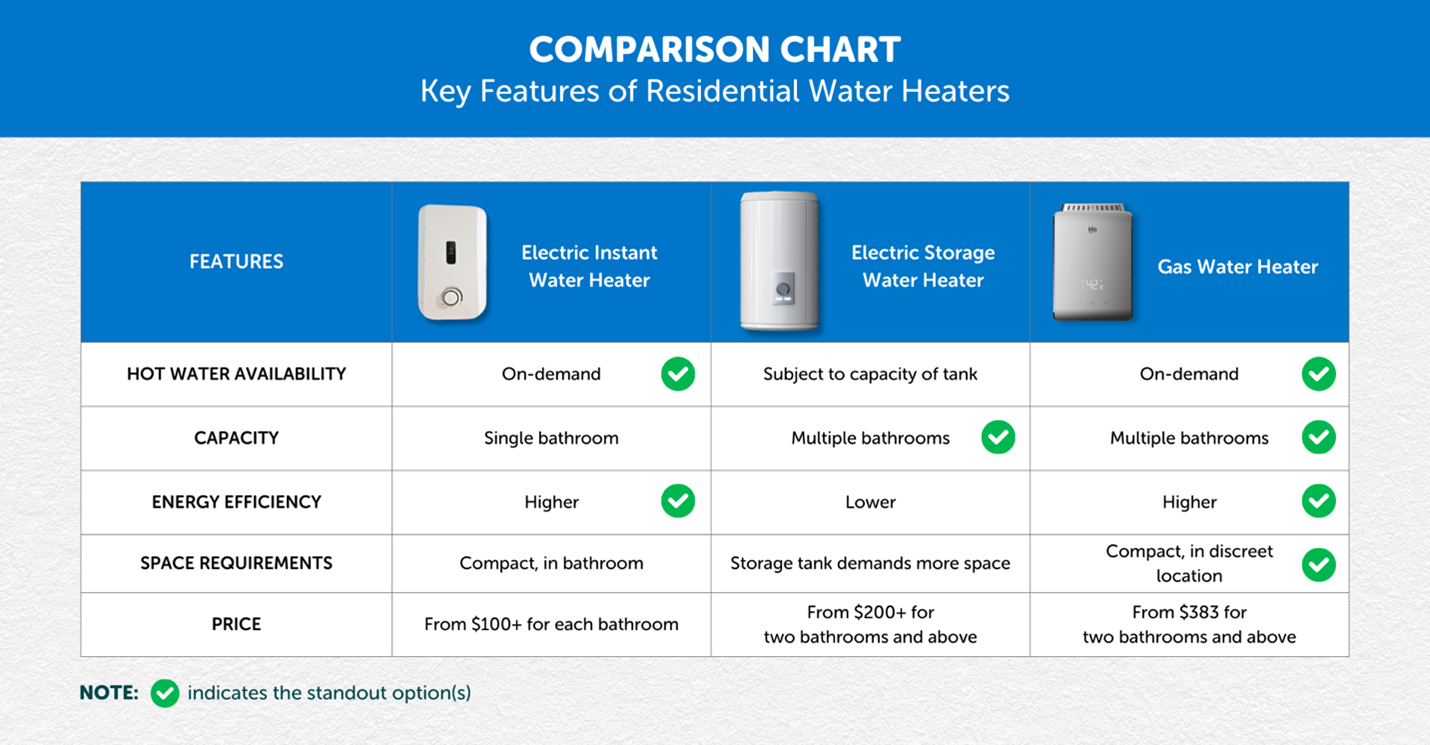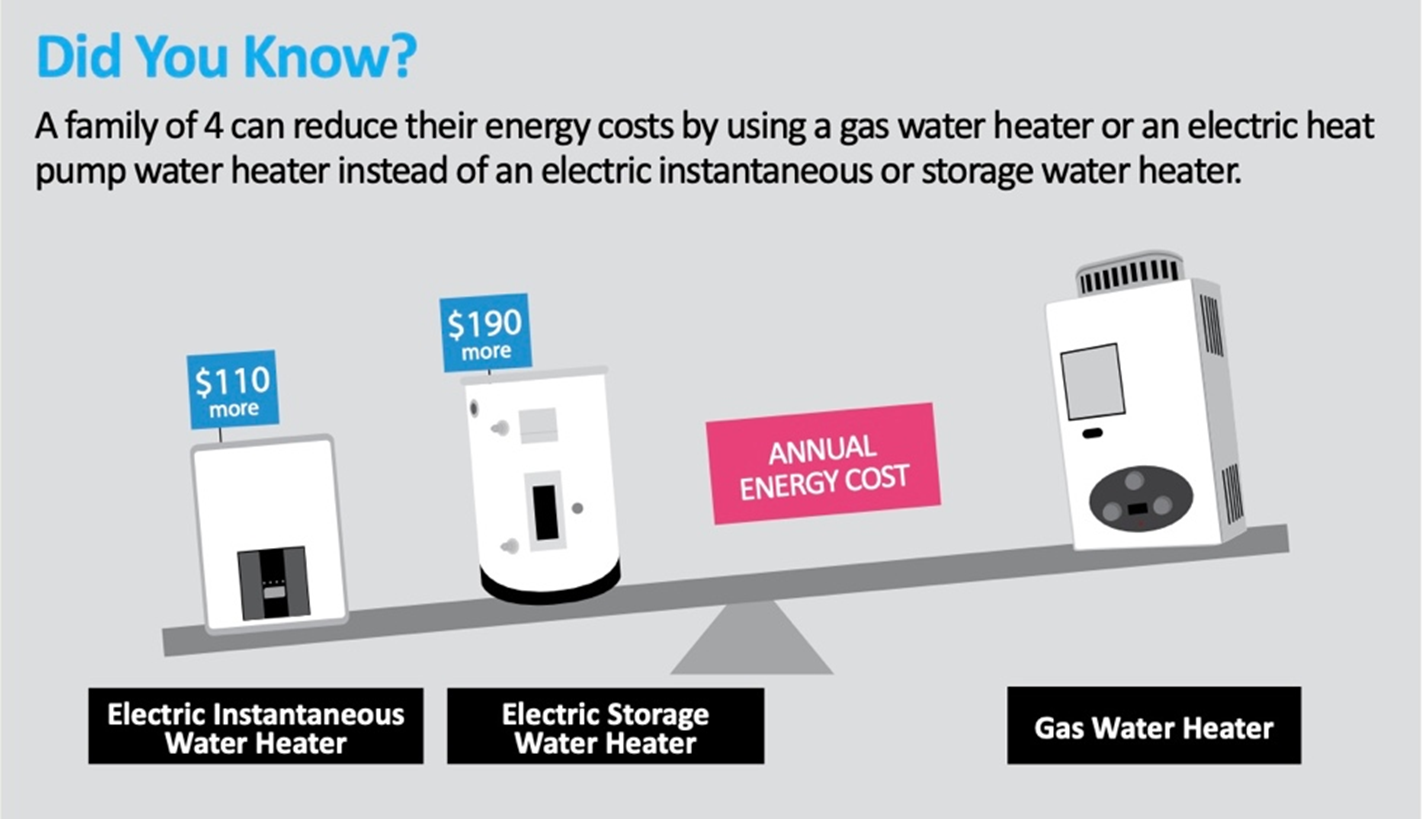Everything you wanted to know about water heaters but never asked


Choosing a water heater in Singapore can be daunting due to the wide range of options. It is natural to feel unsure — after all, how often do you buy one?
With conflicting information online, it is easy to get confused. Rest assured, we are here to answer and clear up common questions and misconceptions about water heaters so you can make an independent and informed decision for your home.
With over 160 years of legacy and heritage, City Energy is a trusted energy solutions provider regulated by the Energy Market Authority (EMA) and has a strong reputation for reliably delivering continuous piped gas.
While people may associate piped gas with SP Group — which manages Singapore's electricity and gas infrastructure — through receiving utility bills from them, SP Group acts only as the billing agent for piped gas (supplied by City Energy), water and other essential services.
In Singapore, City Energy is the sole provider of piped town gas, which is used extensively by over 900,000 residential homes, restaurants, food factories, hawker centres, hospitals, hotels, Changi Airport, and many other commercial and industrial locations.
If your home already uses piped gas for cooking, it means you are connected to the gas network and are familiar with its reliability as an energy source. This makes switching to a gas water heater a convenient choice. Since all BTO flats in Singapore have access to piped gas, gas water heaters represent a convenient and reliable source of hot water.
However, homeowners are often faced with the decision of which water heater best suits their needs. Let's take a closer look at how the different types of water heaters — gas, electric instant, and electric storage — compare in terms of functionality.
Electric instant water heaters are suitable for providing on-demand hot water in compact spaces and smaller households. Though energy efficient, their limited heating capacity cannot handle high-flow needs like rain showers.
You need one electric instant heater per bathroom, which may cost more than a single heater designed for multiple bathrooms. In addition, these heaters are a fixture on your bathroom wall, which may not appeal to those who prefer an uncluttered aesthetic.
Homeowners who want the rain shower experience might consider an electric storage water heater. For larger households, a high-capacity storage tank is needed to ensure everyone gets sufficient hot water.
The downside is these occupy a lot more space because of their storage tanks. Electric storage water heaters are also less energy-efficient.

Gas water heaters combine the strengths of both electric types without their drawbacks. They provide instant heating like electric instant heaters while delivering the consistent flow rates of storage units, which is ideal for more luxurious experiences.
As gas heaters deliver hot water instantly to multiple bathrooms, they do not require a bulky storage tank and can be installed discreetly to save space. Whether you are enjoying a refreshing rain shower or a relaxing bath, a single gas heater will efficiently meet all your needs — which brings us to the next question.

Efficiency is a topic that often confuses people, especially when comparing gas and electric water heaters. The reality is that efficiency can vary due to factors like local energy costs and climate, which explains the wide range of experiences shared online.
However, the comparison is easier in Singapore, thanks partly to the National Environment Agency (NEA). The government agency found that gas water heaters have a significant efficiency advantage for a family of four, particularly when compared to electric storage heaters.
Another study by NEA revealed that you could save $1,200 over the product's lifetime. NEA has also specified on its website that if your flat has access to the gas network, you should consider installing a gas water heater over an electric storage water heater.
Now that we know that gas water heaters offer significant long-term savings for Singaporeans, let's look at installation and maintenance considerations.
Generally, water heaters prioritise functionality over aesthetics, and placement options are defined by their heating method. Electric instant water heaters provide instant hot water, but you will need one in every bathroom. One suitably large electric storage heater serves multiple bathrooms but is placed near the bathroom or kitchen.
As for gas water heaters? Only one is needed to provide instant hot water to multiple bathrooms.
Gas water heaters are installed in well-ventilated areas, typically in the indoor service yards or kitchens of HDB flats and outdoor aircon ledges for condominiums.
The result: a spacious and uncluttered bathroom. There is no bulky electric instant water heater to disrupt clean-looking walls, and there is no need to create a false ceiling to hide an electric storage water heater, which can be expensive to repair and replace if water leaks occur. Gas water heaters are a practical solution for maintaining a clean, minimalist design at home.
It is challenging to give definitive answers for every scenario, but we can make some generalisations. Electric instant water heaters are typically the most affordable for a single bathroom, ranging from $100 to $500. The caveat is that each bathroom requires an individual unit, potentially multiplying costs in homes with several bathrooms.
In contrast, gas instant water heaters from Life at City Energy start at $262 for smaller homes, with models suitable for four- or five-bedroom BTOs starting at $383. This makes them a cost-effective choice, especially for larger homes.
Suppose you need to supply a steady flow of hot water to multiple bathrooms simultaneously or want to install a rain shower or bathtub. In this case, only a gas instant water heater or an appropriately sized electric storage water heater can deliver the required flow rate.
Electric storage water heaters typically cost between $200 and $500, though premium and high-capacity models can cost more. This excludes installation fees and other expenses, especially if you install your electric storage water heater within a false ceiling — which is often necessary as they can take up considerable space.
Hence, gas instant water heaters stand out as the cost-effective solution. It combines the benefits of instant hot water delivery with high flow rates while needing only one unit for the entire home.
They also have the economic advantage of lower energy costs over time. As previously mentioned, gas water heaters are more energy efficient than electric storage water heaters, saving a household $1,200 over the heater's lifespan.
If you want to understand gas water heaters better and need hands-on experience, our newly renovated Life by City Energy store (Plaza Singapura, #03-77/78) is the only retail shop in Singapore offering live demonstrations of gas water heaters and gas dryers.
In collaboration with reputable brands, Life by City Energy offers a curated selection of home and kitchen solutions. Every product is tested, ensuring safety and reliability for our customers. You will find a range of co-branded models at our store, including several from Rinnai, Japan's number-one brand.
We also offer our line of Life by City Energy gas water heaters, launched in Q3 2024, to meet the growing demand for gas water heaters. Our first offering is a smart gas water heater that allows you to remotely control settings like temperature levels and pre-heating schedules via a mobile app.
All gas water heaters at Life by City Energy are certified and meet BS EN 26 (European standard) safety standards for gas-fired instant water heaters. These models include up to 25 built-in safety features, ensuring device longevity and peace of mind for you and your family.
Interested in the nuances that affect the steady flow of hot water? We'll explain the key aspects in the next section.
When discussing water heaters, the terms 'water pressure' and 'flow rates' are often misunderstood.
Water pressure varies across different parts of Singapore depending on the water mains and land elevation, which are outside homeowners' control. As for flow rate, think of it as the volume of water a hose can deliver — higher flow means more hot water at once.
Flow rate is critical for maintaining consistent temperature, especially when multiple outlets are in use. Suppose your water heater is connected to two bathroom showers. If one shower turns cold when the other starts running, your heater likely cannot supply enough to both simultaneously, indicating that its hot water flow rate or capacity is insufficient.
Life by City Energy offers gas water heaters in various capacities to suit different household sizes. Choosing a model with a higher capacity ensures a steady flow rate and minimises cold water shocks when multiple showers are in use.
Higher flow rates are vital for larger households with multiple showers running simultaneously. Gas water heaters with higher flow rates ensure a consistent flow of hot water, even during peak usage. While models with high flow rates tend to be more expensive, they are specifically designed to handle a higher output. Simply put, they certainly are well worth the investment.
Cold lag — waiting for hot water to reach your faucet or shower — is an issue that affects all water heaters, whether they use gas or electricity and whether they are storage or instant heaters.
The time you wait is directly related to the distance between the heater and the outlet. While some cold lag is inevitable, there are ways to minimise it.
One solution is to use a smart gas water heater with preheating capabilities (selected models only) and install a recirculation system. Recirculation systems are beneficial in large multi-storey homes with extended plumbing networks. They keep hot water circulating through the plumbing, ensuring it is readily available at the tap or shower.
Understanding the facts about gas water heaters can make all the difference when choosing the right water heater for your home. With their proven energy efficiency, cost savings, and reliable performance, gas water heaters offer a compelling solution for households in Singapore.
With smart-enabled options, you can enjoy even greater control and convenience, managing your water heater remotely to optimise energy usage.
Whether you are looking to change your current water heater or exploring options for a new home, gas water heaters deserve serious consideration. Visit Life by City Energy to learn more about the benefits of gas water heaters and discover why they might be the perfect fit for your home.
Visit us at:
Life by City Energy
68 Orchard Rd, Plaza Singapura, #03-77/78, Singapore 238839
Operating hours: 11 am to 9.30 pm daily, including public holidays
For more information about how to prepare your home for piped gas home solutions, visit https://gettingstarted.cityenergy.com.sg/
DID YOU KNOW? City Energy offers a seamless, one-stop solution for existing homeowners to switch their electric instant or storage water heaters to gas water heaters. Contact us at 1800-555-1661 or email life@cityenergy.com.sg to arrange a non-obligatory, free site inspection.
[embed]https://www.youtube.com/watch?v=WSBem4RDlGo[/embed]
This business broadcast service is brought to you by Gloo Public Relations. We have not reviewed or endorsed the content.
For any corrections and clarifications, please send it to Gloo Public Relations at gloo@gloopr.biz. If you still require further assistance, please contact our support team at businessbroadcast@asiaone.com.